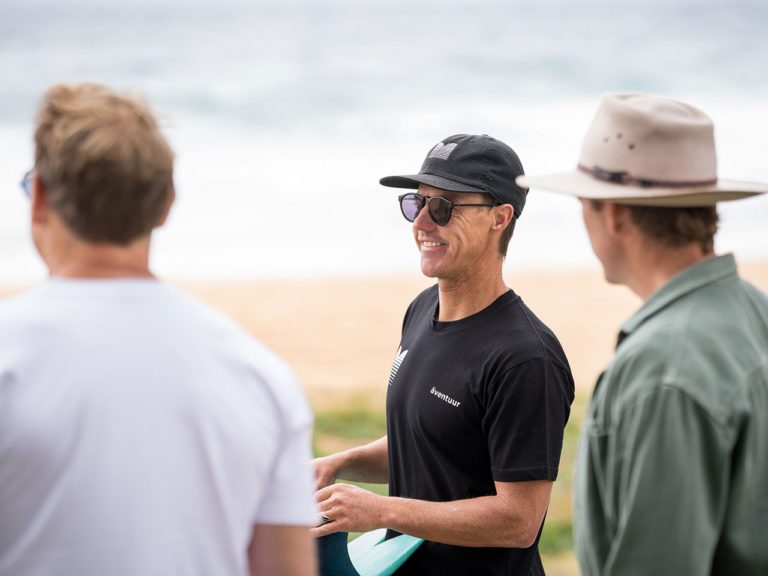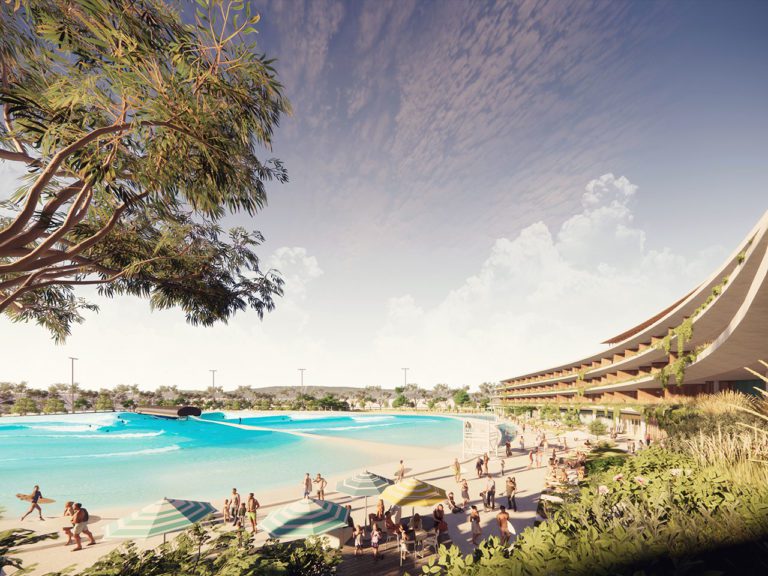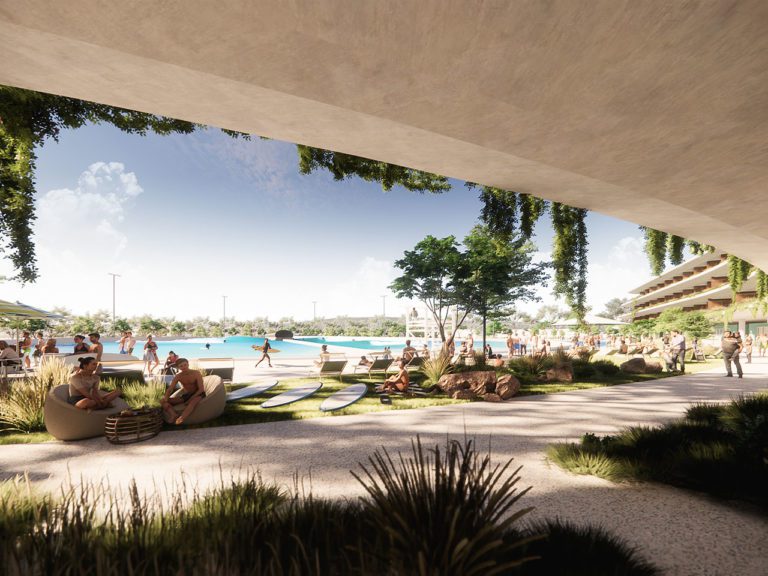
Interview: Ace Buchan on the WSL Changes, His New Surf Park Gig, And Why He Still Won’t Say The R Word
Stab Magazine | 20 March, 2022
2020 was cancelled.
In 2021, tour veteran Ace Buchan chose to skip Hawaii to be with his family. He broke his back at Margarets in May. Missed Rottnest while rehabbing. Then, in Mexico, after losing a frustratingly slow heat to Conner Coffin, he learned that Tahiti — an event he won back in 2013 — had been cancelled. His career as he knew it might be over, and this is not how he’d planned it.
If you don’t feel sorry for Ace, that’s OK.
“As athletes I think we need to be better about reading the room,” he tells me from his home in Avoca on the Central Coast of New South Wales. “We have it so good.”
It’s 2022.
His wife, Beck, is out with two of their three kids. Ace is icing his right ankle. Three days ago he went under the knife for tightrope stabilization. He’s on borrowed time for this interview, as his middle daughter, Indy, is only temporarily occupied with Bluey. Soon, the iPad will run out of juice, the rest of the family will come home and the domestic chaos — sorry, bliss — that’s become the norm of the last couple of years will return.
Till then, he’s got me in his ear and the Sunset contest on TV. Fitting. We’d talk a lot about competition. How it shaped him. How he still loves it. And why, despite countless opportunities beyond the sport, he’s not ready to say he’s done.
STAB: Have you been enjoying the comp?
ACE BUCHAN: I was watching Molly [Picklum] yesterday. She’s from the Central Coast and I’ve surfed a lot with her through COVID. She really goes for it, too. Like, she’s not afraid. I think a lot of these young girls coming on now with the new locations — Pipe, Sunset, G-Land, Tahiti — could completely rattle the status quo, which will be cool. A girl like Molly, she’s been grooming herself for that kind of tour. Even just watching the women at the Pipe event was great. It’s hard to not have a smile on your face when you see Moana coming out of the tube with a big grin on her face.
Do you think about how that influences your daughters?
Yeah, as a father of two young girls who love to surf, that’s really cool to see. It’s just nice to be able to bring up kids in a world where you can essentially raise a boy and a girl the same. Twenty years ago, people probably would’ve looked at you weird if you were surfing with your daughter. Whereas now I’ll take Ruby down after school and there’s probably more girls surfing than there are guys.
The WSL has seen a lot of changes in recent years. Did you take part in those conversations when you were on tour as the surfer’s rep?
For sure. Since the ASP became the WSL, there’s been a series of iterations of what the tour looks like. It’s always trying to strike that balance between upholding the integrity of the sport and not alienating your core audience, but evolving at the same time. Obviously, there are aspirations to expose surfing to more people and grow the fan base. But it’s a fine balance, and this year there’s been quite a lot of change, not only on the CT with the mid-year cut and the finals, but also with the calendar, being the first full year where it starts early in Hawaii, then finishes early and shifts the focus to the Challenger Series.
Do you feel like surfing actually has the potential to appeal to people that don’t surf?
My gut feel would be that yes, surfing absolutely has the ability to appeal to a wider audience. I guess that assumption is based on just looking around and seeing how much surfing and the surf lifestyle is leveraged outside of the endemic industry, whether that’s in advertising or other means. I think there is a broader audience there to tap into, and it’s obvious that that’s the aim of the WSL.
Professionally, surfing’s still a pretty young sport. It’s not even 50 years old. So when you stack it up against some of the biggest sports, it doesn’t really compare. But I think the unique thing about what we do is that it truly is a lifelong pursuit. I have been on tour and, for better or worse, been defined by competing. But surfing doesn’t stop. You’re still running down the beach towards great waves, whether that’s with a jersey on, with your kids, with your dad or with your mates, you know? I guess for purists, it’s like a battle of…why are we trying to monetize that?
Back in August you said, “I’d love to finish out my career in front of my kids and show them that with dreams and belief you can achieve anything.” Do you still feel the same way?
In short, yes. But look, when I was packing up the car to go to the Gold Coast at the start of 2020 and we got the call that it was off, there was definitely a sense of relief there. I’d found a way to travel the world with my family and compete at a high level, and I wouldn’t have it any other way, but it definitely took its toll. The opportunity to take a breather was welcomed at the time.
Then when things started back up, it was an incredibly difficult time to travel for an Australian with a young family. We obviously had a really tight quarantine coming back in, two weeks in isolation. And when the tour was called back on, Beck had just lost her father, which was really tough for her and our family. The prospect of leaving to go to Hawaii, and then to Santa Cruz, being away for three months, just didn’t feel right. But in a sense I was put in a position where I had to choose between my career and my family.
It wound up being a shortened year, and just a really unsatisfying year compared to the 15 or so prior. So to completely shut the chapter on something that I really love doesn’t feel right.
Does that mean when your ankle is healed you’ll take on the Challenger Series or QS?
It looks like it actually starts out here in May at Snapper Rocks, which is probably a really good goal for me. The Challenger Series looks really cool, but the thought of paddling out at Huntington Beach and surfing against kids half my age, that doesn’t feel like where I’m at. So whilst the hunger to compete is there, I think it’s to compete in good waves where I can showcase my best surfing. The WSL has expressed the chance for me to potentially come back and do a few events depending on a bunch of different factors, so I’d love to do that if there’s a chance. We’ll have to wait and see.
Is that opportunity to compete in a final few events the reason you’re hesitant to make a definitive statement saying that you’re retiring?
I just don’t feel like putting a label on it is the right thing for me to do at this point in time. But I also know that professional sport waits for no one. The world champ just decided to take the year off and nobody has mentioned him in two weeks, we’ve all just been glued to Pipe and Sunset. And I think that shows that the sport is in a really healthy position, with a great cast of characters. Professional surfing is cut throat and it will move on with or without you.
Have you given much thought about life after competition?
Pretty early on in my career I tried to diversify the things that I put time into, because I felt like that helped my performance. I love surfing, but it’s not who I am. So I’ve had exposure to a lot of different things, whether that was writing pieces for surf mags, public speaking, charities, or working with you at Awayco.
Anything you’re working on now?
During the pandemic I had more bandwidth, being at home, and the most recent thing I’ve looked at in terms of making that transition is the surf park space. I’m currently working with äventuur, a surf park development group based in L.A.. We’ve got one park confirmed in Perth, which is exciting, because they have a super keen surf population, but a frustrated one. So I think it’s a good fit.
Originally I grappled with it, like, “Is this the right opportunity for me to look at?” But these things are coming and I’d much prefer to be on the inside helping to create something that can be a community asset wherever they’re built. In terms of my role, I’m really looking at the entire surf experience, but also through the environmental and social lens.
I’m really interested in the idea of surf therapy being the cornerstone of broader wellness, and there are many great examples of that. Like, you took us down and spent the day with the City Surf guys in San Francisco, and I’ve done the same with Waves For Change in South Africa. Surf parks have a great role to play there.
You also seem to be leaning more and more into the environmental side of things. Can you speak to that?
As an athlete, it’s pretty easy to jump on things digitally, but after a while, at least for me, I wanted to be tangibly associated with something that was more real than just supporting things remotely. Before the borders shut down, I went down to Tasmania to visit this rainforest in the Northwest that’s been threatened by mining and logging, and the surf community’s actually been super vocal and against it. It was a super eye opening experience to go down there and be shown around by some people that I’ve looked up to, and experience something completely removed from the coast.
Locally, I was lucky to be involved in the campaign to stop an offshore fossil fuel development, in front of Australia’s most populous coastline. Besides obvious threats to wildlife, the need for us as humans to stop our reliance on fossil fuels that are heating the planet at this dangerous rate is the main point. We’ve gotta find a way to transition away from that.
How do you think about chasing waves in cars and hopping on planes that burn a bunch of fuel, while simultaneously campaigning against those things?
It’s about everyone just looking at themselves and saying, “Hey, what can I do?” I’m an athlete and I have a platform that I try to use for good. I’m not perfect, but we all have a role to play, especially as surfers. We are the custodians of the ocean. Just this week in my home state, the NSW government announced a ban on all future and pending offshore mining. That’s massive, considering a year ago this coastline was seriously under threat. There’s no doubt the surfing community played a crucial role in that. We’ve held rallies, virtual town halls, paddle outs and even went to the Capital for a peaceful protest and a series of talks with politicians across the political divide. Groups like The Surfrider Foundation and Surfers for Climate are actually making a difference.
I’ve seen commenters on your Instagram calling for you to get involved in politics. Any interest?
[laughs] No, not really. I think…
Oh c’mon, that’s exactly the answer you’d give before you announce your candidacy!
I mean sure, I’ve considered it. But it’s not an aspiration I hold currently. I don’t want to go live in Canberra, the capital, where all the politicians in Australia live. There’s no surf there. There’s no ocean. I’ve been down there a few times and, it’s funny, someone said the other day, “Oh, you’re just a government boot licker.” And it’s like, I was down there protesting on the lawns of parliament a couple of months ago, I’m pretty sure that’s not boot licking. But honestly, I’m too excited about chasing waves and travel, food, culture, writing, and doing all the things I’ve done with my kids, to seriously consider politics.
Subscribe to our newsletter below for all the latest news & press from Aventuur
Ace Buchan named surf and sustainability director at Aventuur
Wavepool Mag | 22 March, 2022
Micro’s Aventuur Adventure
Surfline | 2 November, 2021
Perth Could Be Getting the Southern Hemisphere’s Largest Artificial Wave Park
Broadsheet | 14 September, 2021
State Government announces Aventuur as preferred developer of WA’s first surf park in Jandakot
The West Australian | 12 September, 2021




